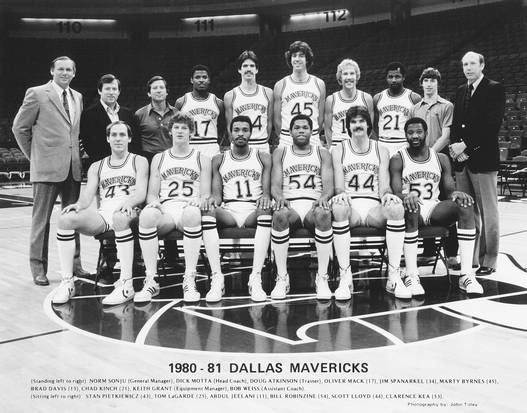Basketball, media, and robots coming for our jobs
With the events of last week's election pretty much consuming and subsuming national attention last week you probably missed this really interesting story on the intersection of sports, media, and technology, one that raises some interesting questions about the future or automation and work.
First a little background on the story from last week, then some thoughts on why it is interesting beyond the narrow, 'sports' focus.
Last week Mark Cuban, famous rich guy and owner of the NBA's Dallas Mavericks suddenly revoked the media credentials at Dallas' arena for two Dallas based ESPN basketball writers, Mark Stien and Tim MacMahon. From the first reports that came out, Cuban made the decision to revoke the ESPN pair's credentials because he was disappointed that MacMahon would not be covering every Mavericks game, a change from prior years; and Stein, as a national NBA reporter was thought to only want to cover Mavs games to gain access to players and coaches from the Mavs opponents as they came through Dallas. It was reported that Cuban was particularly miffed by the fact that no ESPN media attended and reported on the Mavs opening night game.
If this story was just about a team owner trying to play strong arm a major media outlet into providing more coverage for his team, it would not be all that interesting, and I would not have decided to write about it here.
But a day or two after the initial media credential ban was announced, the story became more nuanced, and well - interesting.
What Cuban was also protesting, in addition to the reduced coverage of Mavs games in general by ESPN, was what he feels like is going to be the inevitable replacement for at least some human media game coverage - automated game summaries and stories generated by machine learning and algorithms.
Here's some additional detail from an email Cuban sent to the web site Deadspin, who had been reporting on the Mavs-ESPN kerfluffle: (Note: I edited this some for brevity and clarity, the full email is at the link above)
Two things triggered this whole thing. First was when I found out they (ESPN) had cut back or had always offered reduced coverage for 19 nba teams I had no idea this was going on
The second was when espn didn’t cover our opening night and the resultant coverage on their website was a tweet, One highlight and a wire service story
It made me realize that I had expected to be covered by all media, but it no longer was a given
Even though espn was covering the same number of games, if they didn’t think it was a big deal to miss opening night. I had a problem. Not necessarily an espn problem , but a coverage problem
And if it’s 30 games now for 19 teams. What would keep it from being 60 games for 25 teams ?
What was their long term thinking ?
When you realize that the hottest area in technology, and it’s not even close , is machine and deep learning , then it’s an easy step to see where this was going
I told espn this was my concern. They didn’t say they were taking this path. They didn’t say they weren’t. But I voiced these concerns to them
They said they would run their business . I can run mine
So the next question is where would it leave Mavs fans who wanted game results coverage of nothing changed and espn didn’t send a reporter for 30 games ?
It meant for 30 games and inevitably more in the future they wouldn't have a good experience with espn
It meant it was likely that in the near term when they went to espn Dallas they find a couple videos, tweets and a wire service story
How is that positive for any nba team or their fans when 30 games have second rate coverage ?
And what happens and what message is sent to fans when those games are covered by an algorithm in the future ?
Short term this is a Mavs issue. Long term it’s a certainty that our games will be covered algorithmically. Thats a problem across the board for us and the NBA
IMO that devalues our brand . It devalues the fans experience. I feel strongly that now is the time to partner with those who commit to the Mavs and to sending real people to cover the games for Mavs fans
It may seem like we are picking on espn or telling them how to run their business. We aren't. We are trying to protect ourselves and our fans and our future by partnering with those in the written media who commit to us
I know the whole automation thing may not make sense to some. But to me this is no different than saying that streaming would change media in 1995. Or social media would change coverage of sports , etc
Machine and deep learning and algorithmic coverage of sports events is going to happen.
This isn’t about replacing writers. The best writers will always have a place
This comes down to how do we value reporting on a game . Right now I value it more than espn and others and want to partner with the DMN FWST (media outlets), and use our own writers as our focus
Really interesting takes coming from a guy who got rich back in the day, selling a technology company, (Broadcast.com) for millions to Yahoo. Cuban is no Luddite or technophobe.
But at least in 2016, he (probably rightly), feels that despite advances in machine learning and automation that NBA game coverage is still best produced by actual human reporters and not the algorithms. And if you think that the entire idea of an algorithm replacing a human reporter to write sports event coverage think again - it is already happening mostly via technology created by a firm called Automated Insights. You can learn more about what they are doing with automated reporting of minor league baseball games here.
Let's go back on one line of Cuban's email above - "Long term it’s a certainty that our games will be covered algorithmically. Thats a problem across the board for us and the NBA."
In the same message where Cuban admits to using some tough negotiating tactics to push ESPN to continue to provide quality, human coverage of Mavs games, he admits that the algorithmic coverage of these games are a certainty. Today while technology like the one provided by Automated Insights is inferior to human reported coverage, over time it seems apparent to Cuban that the difference in quality will matter less to the media company than the sheer cost savings and efficiency gains that could be realized by replacing human reporters with a computer program.
And Cuban has a problem with that, as it is in his best interests to have top-notch coverage of Mavs games in the media, as he sees that as an extension of his team and of the Mavs brand.
I know this post has gotten pretty long, especially for a busy Monday, but I thought it important enough to try and lay out the context before hitting what I think is the main takeaway which is this:
Just because something can be automated away or a job be done by a robot or a machine instead of a human doesn't mean that it necessarily should. Your customers will decide and balance the tradeoffs between costs, convenience, and quality about the products and services you are offering.
You might think, or your CEO might insist, that automation is always the way to go, but until the robot or the algorithm can do the job almost as good as the human it is replacing, then don't be too quick to agree.
Think I am wrong?
Take a look at the 'self-service' checkouts sometime at a busy grocery store or big box home improvement retailer?
Anyone using those? Do they provide a great experience?
Or would you rather wait an extra few minutes and check out with a human cashier?
Have a great week all!
 Technology,
Technology,  sports tagged
sports tagged  8 Man Rotation,
8 Man Rotation,  Sports,
Sports,  Technology,
Technology,  automation,
automation,  robots
robots  Email Article
Email Article 
 Print Article
Print Article 


